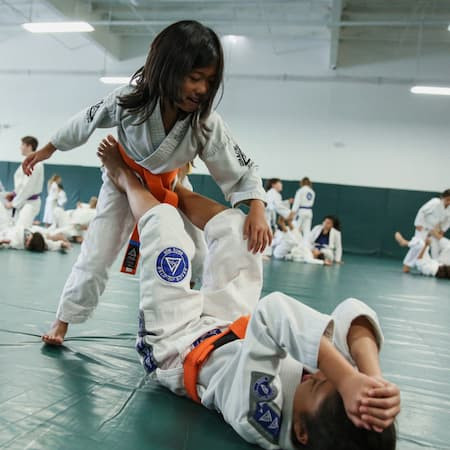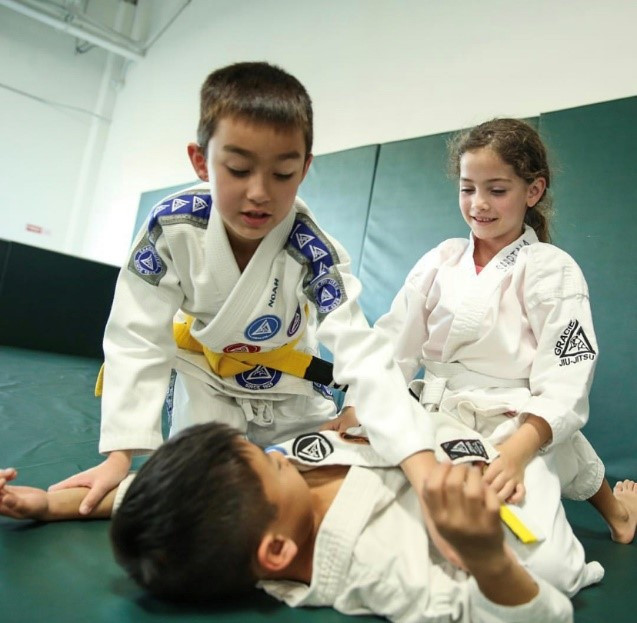Jiu Jitsu – The Best Self-defense for Kids (part 2 of 2)
Basic Self-Defense
Playing jiu-jitsu can also involve teaching children simple moves that are solely defensive and can be used to prevent bullying. In the below video, Relson Gracie provides a great example when he asks some of Robin’s kids to break free of a neck grab or a wrist grab. These are safe, simple moves that children of virtually any age can learn and master.
Of course, the importance of these skills extends beyond the ability to escape from a specific hold. Children who are taught the basics of self-defense also become more confident, have more self-esteem, and learn to stand up for themselves. This is a point that Gracie University chief instructor Rener Gracie returns to time and time again. It is also one of the core messages of Gracie University’s youth program, BullyProof. Rener believes that as more kids learn self-defense, this means more children will stand up for themselves and stand up for each other.
“What I want most for you is this,” Rener tells a group of students in the above video. “You build your confidence for self-defense and ultimately we want to make sure that if someone else is getting bullied or someone else is getting teased, even if you don’t know them, you have the opportunity and you have the choice to say, ‘Hey, I want to help.’”

Enrolling my son or daughter in a Children’s Self-defense class. What should I expect and how do I know what’s right for my child?
Those who are unfamiliar with jiu-jitsu classes and those who have never witnessed what a youth jiu-jitsu program looks like will probably wonder how the class is conducted. How do kids stay safe when learning a martial art? What kind of moves will my child learn? Can jiu-jitsu make an incorrigible kid more well-behaved?
The answer to the last question is probably not. As Ryan Young of Kama Jiu-Jitsu notes in the below video, jiu-jitsu instructors may only see your child for 45 minutes or so per day. If your goal is behavior change without making changes to what happens in your household, you may want to look for another outlet.
The answer to the other two questions largely depends on the kind of school your child attends. As Ryan explains, parents need to understand that there is not a single type of jiu-jitsu, and that the type of school your child enrolls in will inform their jiu-jitsu experience. Some classes focus on teaching jiu-jitsu as though it is a sport. Just like any sport activity, instructors know how to keep kids safe and to ensure that everyone has fun while participating in an activity. Furthermore, kids learn a skill, they stay out of trouble, they get plenty of exercise, and there is a competitive element. If you enroll your kids into a jiu-jitsu program that has a strong sport component, Ryan says in the above video, you as a parent should expect to spend weekends going to tournaments and other competitions.

Reasons why learning Self-defense is important for Children.
Parents can also enroll their kids in jiu-jitsu classes that focus on cultivating a self-defense mindset. Like sport jiu-jitsu, the instructors know how to keep kids safe and take precautions to avoid injury. Where the two diverge is in principle. Self-defense classes are notably different in tenor in that they are less rigidly structured, do not focus on competition, and primarily teach kids how to apply jiu-jitsu in real-world situations.
For example, the self-defense focused Jiu Jitsu School does not teach submissions to kids until they reach middle school, even if there are kids as young as five years old enrolled in the school. Instead of being taught these kinds of moves, younger kids learn the basic principles and positions of jiu-jitsu with the goal of learning how to get out of a bad situation with a bully or how to respond should a stranger try to grab them. For a child who has been taught jiu-jitsu solely as a sport, they may respond to the bullying by throwing the bully into a chokehold rather than simply holding them down. When interacting with a strange adult, they may not know how to respond in a way that alerts other adults should trouble arise. “Competitive success is not necessarily equivalent to self-defense success,” Ryan says in the above video, but also notes that the two are in no way mutually exclusive.
While some parents enroll their children in some form of martial arts as part of an activity. Most are interested in the practical self-defense system their child will learn. Self-defense is not only about physically fighting back, but empowering your child by developing their mental, emotional and physical fortitude should their confidence or sense of self-worth be threatened.
Our advice to any parent who may be interested in enrolling their child in a class is to engage the owner of the school before signing up. Ask them about their curriculum, what they expect of their students, and how they measure success in their school. Make sure their program conforms to your expectations and promotes the goals that you want to set for your children.



